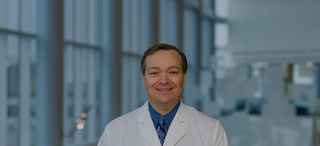A Pioneer in Plasma Cell Disorders
October 26, 2020
Clinical Trials at UT Southwestern
As an academic medical center, UT Southwestern offers clinical trials that give eligible patients access to the newest therapies. Learn more about clinical trials at UT Southwestern.
For more than a decade, Larry Anderson Jr., M.D., Ph.D., has been committed to patient care and medical progress.
Larry Anderson Jr., M.D., Ph.D., joined the UT Southwestern faculty in 2008. He is currently an Associate Professor in the Department of Internal Medicine, Division of Hematology/Oncology and is also the Director of the Myeloma, Waldenström’s, and Amyloidosis Program and a member of the Blood Cancers/Transplant and Cell Therapy Program.
Dr. Anderson exclusively treats patients with plasma cell disorders, including multiple myeloma, Waldenström’s macroglobulinemia, amyloidosis, and other gammopathies, and he specializes in treating these diseases at all stages but with a particular focus on bone marrow transplantation.
He is currently caring for approximately 600 plasma cell disorder patients, and at one time, he cared for about 90% of the myeloma patients who came to UT Southwestern. “The myeloma program has grown since I joined in 2008 and we are now hiring our third faculty position,” Dr. Anderson says.
“Our approach to patient care is a team approach. As specialists, we work as a team with our patients, nurses, and physician assistants to ensure each patient’s specific goals and needs are taken into consideration, including their lifestyle, their living situation, and their other disease comorbidities,” Dr. Anderson says. “We now have many different treatment options that we can mix and match to personalize treatment and provide the most compassionate yet state-of-the-art care to help patients have the best quality of life possible.”
Dr. Anderson’s team at UT Southwestern is the only practice specializing in plasma cell disorders in the region. This means that his team cares for patients throughout all phases of therapy from diagnosis and stem cell transplant through maintenance and relapse.
“Our approach to patient care is a team approach. As specialists, we work as a team with our patients, nurses, and physician assistants to ensure each patient’s specific goals and needs are taken into consideration, including their lifestyle, their living situation, and their other disease comorbidities.”
Larry Anderson Jr., M.D., Ph.D.
Improving Outcomes and Lives
In addition to patient care, Dr. Anderson has led numerous clinical trials of promising new treatments for plasma cell disorders and continues to strive toward finding a cure for myeloma. “Over the past decade, 13 new drugs have been approved for multiple myeloma, and outcomes have been steadily improving with average survival in the 10-year range,” he says.
For Dr. Anderson, the most exciting area in myeloma research right now is immunotherapy, including chimeric antigen receptor (CAR) T-cell therapy and bispecific T-cell engagers (biTE) therapy. “It’s rewarding to be able to continue having long-term relationships and follow-up with patients that we’ve been following for many years and to see patients that have failed every treatment option then achieve complete remission for sometimes two years or more after CAR T-cell therapy,” he says.
Under Dr. Anderson’s leadership, the myeloma program currently has several ongoing CAR T-cell trials for myeloma and is about to open a biTE therapy trial. “We were actually the lead enroller in the global registration study, the KarMMA study, which is investigating CAR T-cell therapy in relapsed/refractory myeloma,” Dr. Anderson explains.
Background and Education
Given his medical science background and achievements, it may come as a surprise to learn that Dr. Anderson started out as an undergraduate business major at Texas A&M University. However, when his roommate introduced him to an article about Dr. Steven Rosenberg, who was a pioneer in cancer immunotherapy, this prompted him to major in biomedical science instead. “I realized I could actually do research, see patients, and advance the field of medicine,” Dr. Anderson shares.
In 2000, he earned both an M.D. degree from the University of Texas Medical School at Houston and a Ph.D. in immunology from MD Anderson Cancer Center and the UT Graduate School of Biomedical Sciences/Health Science Center at Houston, where his dissertation involved the study of cancer vaccination in the setting of allogeneic bone marrow transplantation.
He completed an internship and residency in internal medicine at the Mayo Clinic, where he had frequent exposure to patients with multiple myeloma. He then completed a fellowship in medical oncology at the University of Washington Medical Center and Fred Hutchinson Cancer Research Center. “At my institution, no one was conducting immunotherapy research on myeloma; this allowed me to focus on that passion and carve it out as my area of expertise to conduct streamlined, impactful research,” says Dr. Anderson.
Dr. Anderson is a Diplomate of both the American Board of Internal Medicine (ABIM) and the ABIM Subspecialty Board of Medical Oncology. His research has been funded by the American Cancer Society, National Institutes of Health, American Society of Clinical Oncology, and the Multiple Myeloma Research Foundation.






